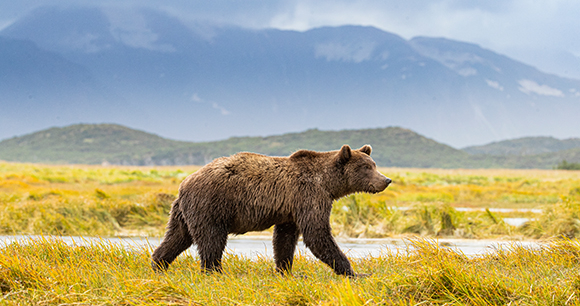
Washington, DC—The US House of Representatives is set to vote this week on the Interior, Environment, and Related Agencies Appropriations Act (H.R. 8998), a bill that severely slashes conservation funding for the coming fiscal year and leaves imperiled species with a fraction of the resources necessary to promote recovery. The Animal Welfare Institute (AWI) is deeply dismayed to see that, furthermore, the bill is stacked with poison pill riders designed to block or remove specific wildlife protections, even targeting efforts to save a number of threatened and endangered species.
“This bill does not reflect Americans’ love for our wild spaces and species and is a dangerously irresponsible spending roadmap at a time when biodiversity is in perilous decline,” said Nancy Blaney, AWI’s director of government affairs.
If this bill passes Congress, the Department of the Interior’s budget will shrink dramatically to $14.7 billion—a 74% reduction. Within this total, the US Fish and Wildlife Service budget would be reduced by $144 million to $1.3 billion, including a 20% cut in funding to list new species under the Endangered Species Act (ESA).
The poison pill riders, which attempt to undermine species recovery by making conservation decisions based on political interests rather than science, include:
- Blocking funding to protect the sage-grouse, lesser prairie-chicken, northern long-eared bat, sagebrush lizard, and wolverine under the ESA
- Blocking funding to reintroduce grizzly bears to the North Cascades ecosystem in Washington and the Bitterroot ecosystem in Idaho and Montana
- Blocking funding to reintroduce bison to the Charles M. Russell National Wildlife Refuge in Montana
- Delisting the Greater Yellowstone ecosystem population of grizzly bears
- Delisting gray wolves
- Blocking funding to extend ESA protections to threatened or endangered fish held in captivity
- Blocking funding to implement the Biden administration’s newly finalized ESA regulations
- Finalizing a Trump administration rule that prevents certain interagency consultations on projects that may impact ESA-listed species on Bureau of Land Management (BLM) and US Forest Service lands
- Blocking funding to implement a rule that limits lethal management of predators within the National Wildlife Refuge System
- Blocking any restriction on the use of lead ammunition or tackle used on federal lands or waters
- Blocking any restriction on hunting, fishing, or shooting on federal lands, which could include wildlife killing contests
- Blocking funding to implement, administer, or enforce any restrictions on offshore energy development and production aimed at reducing disturbances to critically endangered North Pacific right whales, North Atlantic right whales, or Rice’s whales
Wild Horses and Burros
On a positive note, the bill and an accompanying report include some beneficial language pertaining to wild horse and burro management. Importantly, the bill continues protections against commercial destruction and lethal control of wild horses and burros on lands managed by the BLM and US Forest Service.
The House bill also proposes $143 million to fund the BLM’s Wild Horse and Burro Program, a 16% decrease from the agency’s proposed budget for the program. The BLM has a long track record of mismanaging federally protected wild equines—rounding them up from the range (21,000 to be removed this fiscal year alone) and moving them into expensive off-range holding facilities; reining in this program’s budget could help curtail the rampant and systemic problems within the agency.
The report also calls for $11 million of the BLM’s budget to be set aside to prioritize humane fertility control for wild horses—namely existing immunocontraceptive vaccines such as Porcine Zona Pellucida. This vaccine has been used successfully for decades, and managing horses on the range through humane fertility control would allow these herds to remain in their natural habitats. The report also calls on the BLM to explore alternatives to helicopter roundups—brutal, chaotic operations that break apart family bands and routinely result in injuries and fatalities to the horses.
Unfortunately, the report also includes vague and troubling language supporting the BLM’s use of “permanent sterilization” on wild horses (potentially involving gruesome and dangerous surgical procedures), as well as directives that tacitly condone the BLM’s overreliance on removals from the range. AWI will continue working with lawmakers to ensure that the final appropriations package bolsters protections for these cherished animals.
Protecting Other Wildlife
AWI also appreciates the inclusion of language in the report aimed at increasing transparency around trapping on national wildlife refuges, encouraging collaboration on nonlethal beaver management methods, developing measures to prevent massive manatee die-offs from reoccurring, and urging federal agencies to use best practices in their operations to avoid bird collisions. The bill also funds the Prescott Grant Program at $3 million, providing competitive grants to marine mammal stranding network organizations to rescue and rehabilitate sick, injured, or distressed marine mammals and, where appropriate, investigate causes of death.
Marjorie Fishman, Animal Welfare Institute
202-446-2128, [email protected]
The Animal Welfare Institute (awionline.org) is a nonprofit charitable organization founded in 1951 and dedicated to alleviating animal suffering caused by people. We seek to improve the welfare of animals everywhere: in agriculture, in commerce, in our homes and communities, in research, and in the wild. Follow us on Facebook, X (formerly Twitter), and Instagram for updates and other important animal protection news.